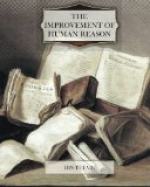[Footnote 13: The Spanish Philosophers.—This is not to be understood of any Christians in Spain, but Mahometans; for the Moors Conquer’d a great part of Spain in the Ninety Fifth Year of the Hegira, which answers partly to the Year of our Lord 710. Afterwards, as Learning grew up amongst the Eastern Mahometans, it increased proportionally among the Western too, and they had a great many Learned Men in Toledo and other Places. The Author of this Book was a, Spaniard, as appears from an Expression towards the end of this Preface.]
[Footnote 14: Algazali.—He was an Eminent Philosopher, Born at Thus a Famous City of Chorafan, in the Year of the Hegira 450, of Christ 1058. He died in the Year of the Hegira 505, of Christ 1111-2. Dr. Pocock’s Elenchus Scriptor.]
[Footnote 15: Heresy.—In Arabick the Word Kafara, signifies to be an Infidel, but they use it commonly as we do the word Heresy, viz. when a Person holds any thing erroneous in Fundamentals, tho’ Orthodox in other points.]
[Footnote 16: The Doctrine of the Suphians—The Suphians are an Enthusiastick Sect amongst the Mahometans, something like Quietists and Quakers; these set up a stricter sort of Discipline, and pretended to great abstinence and Contempt of the World, and also to a greater Familiarity and stricter Union with God than other Sects; they used a great many strange and extravagant actions and utter Blasphemous Expressions. Al Hosain Al Hallagi was eminent amongst them about the Year of the Hegira 300. ’Twas he that wrote in one of his Epistles, Blessed is he that possesses the shining light, _&c. and pretended that God dwelt in him. The Learned among the_ Arabians are not agreed, about the derivation of the Word, Sufi, Suphian. It seems not to be known among them till about the 200 Year of the Hegira. The most probable Interpretation of it is from the Arabick word Suph, which signifies Wool, because those that followed this Sect refused to wear Silk, and Cloathed themselves only with Wool. Dr. Pocock and Golius follow this Interpretation; tho’ the latter in his Lexicon seems to doubt whether it is deriv’d from the [Greek: sophos] or from the Arabick Suph. The Sultan of Persia is often call’d the Sophy, because Ismael the first Sultan of that Family now in Persia who began to Reign in the 605 Year of the Hegira, that is of our Lord the 1554/5 was of this Sect. viz, Sufi, a Suphian.]




